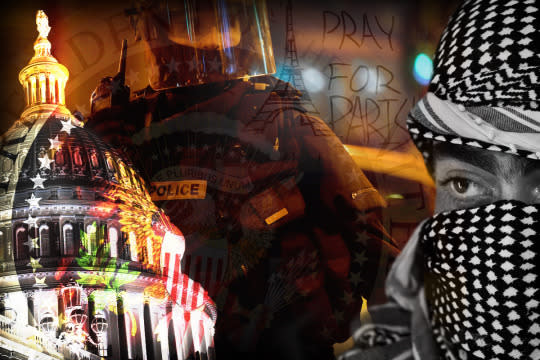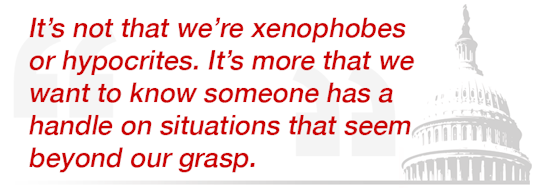ISIS, the 2016 election and the creep of chaos

Yahoo News photo illustration; photos: AP Graphics Bank, Getty Images
Parisians had barely returned to the streets last weekend before analysts on this side of the ocean started talking about the effects of the latest terrorist attacks on 2016. Frank Luntz, the Republican pollster and cable personality, reacted to Saturday’s Democratic debate on Twitter: “The Democrats don’t realize or recognize how afraid the #ParisAttacks have made the country. We are not the same country today.”
Taking a more sober view, the New York Times’ Jonathan Martin, one of the best political reporters around, wrote that the “assault on Paris had thrust national security to the heart of the presidential race” in a way that would recast the primaries, if not the general election too. His colleague Brendan Nyhan cast doubt on this idea; he noted, correctly, that even the killing of Osama bin Laden in the spring of 2011 had little effect on the way voters judged President Obama the following year.
My own sense, based on recent history, is that terrorism probably will have some significant impact in 2016 — but not in the way we’re talking about it right now.
In the short term, of course, the sudden reemergence of terrorist threats presents yet another sharp turn in a primary campaign that has seemed to be about something different every week — immigration, growth and taxes, Planned Parenthood, stabbing one’s mother. Running for the Republican nomination this year is like constantly merging onto a crowded highway only to have the GPS keep chirping at you: “Recalculating … recalculating.”
If Donald Trump and Ben Carson fade after Thanksgiving, analysts will no doubt point to the Paris attacks as the moment when experience and expertise started to matter again. But that fade seems likely to happen in any event, and if it does, you won’t be able to lay it on the issue of terrorism alone; a Reuters poll this week found that conservatives actually trust Trump to handle terrorists more than they do anyone else in the field.
Maybe they figure Trump will just sue all the terrorists into bankruptcy, then seize their assets at auction.
Looking further ahead to the general election, though, there’s not much evidence to suggest that the Islamic State will dominate the debate — or that such a thing as a foreign policy election even exists, outside the minds of some foreign policy experts.
Elizabeth Saunders, a political scientist at George Washington University, has done some exhaustive research on this for a yet-to-be-published book about foreign policy and the electorate. Her conclusion — spoiler alert here for all you academics — is that voters almost always base their vote on “recent economic performance,” rather than on national security, even in times of foreign crises.

The last example of a clear foreign policy election was probably almost a half century ago, in 1968, when the Vietnam War was ensnaring thousands of American families in a deeply personal way. You could argue, I suppose, that 2004 was decided mostly by terrorism, since the economic performance under George W. Bush was less than impressive by that point, and he won anyway. But then you’d also have to acknowledge that the Iraq War was deeply unpopular, too, so Bush’s victory could hardly be considered a clear triumph of foreign policy.
Saunders posits that national security only works as a winning issue, even when war is afoot, when you can draw a sharp and demonstrable contrast between your approach and your opponent’s. And maybe this explains why John Kerry couldn’t capitalize on his foreign policy experience in 2004. Aside from opposing the war, belatedly, he offered little by way of a competing vision, preferring to make the election a straight referendum instead.
Next year’s election will probably offer less of a clear contrast here than you might think, too. Sure, Republicans will accuse Obama of fecklessness and will talk a lot of smack about crushing ISIS, but in the end, it’s a good bet that no Republican nominee who isn’t named Lindsey Graham will vow to send a large number of ground troops into the Middle East, or at least not unless there’s another attack on American soil.
That means the Republican prescription for combating terrorism, stripped of its rhetorical fury, won’t look all that different from the multifaceted approach the president struggled to articulate in a contentious news conference this week (and that Hillary Clinton, should she win the nomination, will no doubt promise to intensify).
But, as Jeb Bush likes to say about 10 times an hour, here’s the deal: Just because terrorism as an issue may not dominate the coming election doesn’t mean the specter of it won’t have some profound impact. Because much as we like to talk about issues as if they can be neatly disentangled and polled, the truth is that all of them — economics, terrorism, trade and crime and whatever else you want to think of — are part of the same overarching emotion in our politics, which is a kind of general insecurity about the world.
Back in 2010, at the height of the Deepwater Horizon debacle in the Gulf Coast, I wrote at some length about the centrality in modern politics of chaos versus control — not in the Maxwell Smart sense of things, but in the perception of voters who see uncertainty and decline all around them, in their communities and their schools and in the images of beheadings and bombings on TV.
This is why Trump’s most resonant line of the campaign — and the most resonant of any candidate, period — is the one where he says that America never seems to win anymore. It’s nonsense, since the United States still dominates the world both militarily and, for the time being anyway, economically. But Trump is nothing if not a shrewd reader of his audience, and he has calibrated his pitch to voters who just want someone — anyone — to get some control over events that always seem to overtake us.

This also explains, to a large extent, the appeal of Trump’s beautiful, big and fanciful wall, and the hysteria that suddenly surrounds a small number of Syrians seeking shelter from war and privation — all in a country where virtually everyone is descended from immigrants and refugees.
It’s not that we’re xenophobes or hypocrites. It’s more that we want to know someone has a handle on situations that seem beyond our grasp, and absent that, we tend to gravitate toward drastic solutions and easy answers.
You can bet that the 2016 election — like all modern elections — will be mostly about the larger creep of chaos in all aspects of the society. And ISIS is as powerful an embodiment of chaos as anything in American life right now.
If Obama can’t persuade Americans that his plan to “contain” the Islamic State is working, it’ll make it considerably harder for Clinton (or some other nominee) to do something that is extremely rare already: win a third consecutive term for a party. And if Republicans nominate a Trump or Carson (which I still find improbable), they’re likely to find out that cluelessness about policy is a virtue only when the broader electorate isn’t paying attention.
We are, in fact, the same country today that we were a week ago, and beset by the same acute insecurity. And that’s why terrorism is going to matter next year, even after Paris has faded from our minds.

